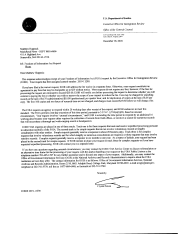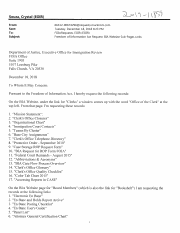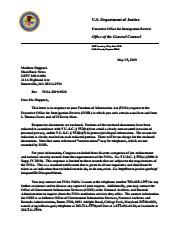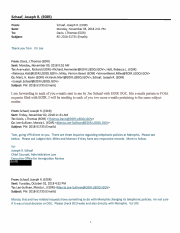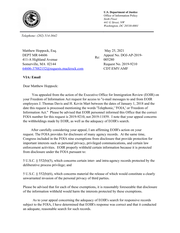E-mail Correspondence With ACIJ Mart and J. Thomas Davis Regarding Telephonic Hearings
| Tracking # |
2019-11859, DOJ-AP-2019-005280 2019-11859 2019-11290 2019-9210 |
| Submitted | Dec. 1, 2018 |
MuckRock users can file, duplicate, track, and share public records requests like this one. Learn more.
Communications
From: Matthew Hoppock
To Whom It May Concern:
Pursuant to the Freedom of Information Act, I hereby request the following records:
The e-mail messages to and from EOIR employees J. Thomas Davis and H. Kevin Mart between the dates of January 1, 2018 and the date this request is processed mentioning the words "Telephonic," "FOIA," or "Freedom of Information Act.
To clarify my request, I seek all responsive records regardless of format, medium, or physical characteristics. In conducting the search, please understand the terms “record,” “document,” and “information” in their broadest sense, to include any written, typed, recorded, graphic, printed, or audio material of any kind. We seek records of any kind, including electronic records, audiotapes, videotapes, and photographs, as well as letters, emails, facsimiles, telephone messages, voice mail messages and transcripts, notes, or minutes of any meetings, telephone conversations or discussions. My request includes any attachments to these records, including e-mail attachments. No category of material should be omitted from search, collection, and production.
Please search all records regarding agency business. You may not exclude searches of files or emails in the personal custody of your officials, such as personal email accounts. Records of official business conducted using unofficial systems or stored outside of official files is subject to the Federal Records Act and FOIA. See Competitive Enter. Inst. v. Office of Sci. & Tech. Policy, 827 F.3d 145, 149–50 (D.C. Cir. 2016); cf. Judicial Watch, Inc. v. Kerry, 844 F.3d 952, 955–56 (D.C. Cir. 2016).
It is not adequate to rely on policies and procedures that require officials to move such information to official systems within a certain period of time; I exercise and specifically preserve and assert my right to records contained in those files even if material has not yet been moved to official systems or if officials have, through negligence or willfulness, failed to meet their obligations. See Competitive Enter. Inst. v. Office of Sci. & Tech. Policy, No. 14-cv-765, slip op. at 8 (D.D.C. Dec. 12, 2016).
In addition, please note that in conducting a “reasonable search” as required by law, you must employ the most up-to-date technologies and tools available, in addition to searches by individual custodians likely to have responsive information. Recent technology may have rendered DHS’s prior FOIA practices unreasonable. In light of the government-wide requirements to manage information electronically by the end of 2016, it is no longer reasonable to rely exclusively on custodian-driven searches. Presidential Memorandum—Managing Government Records, 76 Fed. Reg. 75,423 (Nov. 28, 2011), https://obamawhitehouse.archives.gov/the-press-office/2011/11/28/presidentialmemorandum-managing-government-records; Office of Mgmt. & Budget, Exec. Office of the President, Memorandum for the Heads of Executive Departments & Independent Agencies, “Managing Government Records Directive,” M-12-18 (Aug. 24, 2012), https://www.archives.gov/files/records-mgmt/m-12-18.pdf.
Furthermore, agencies that have adopted the National Archives and Records Agency (NARA) Capstone program, or similar policies, now maintain emails in a form that is reasonably likely to be more complete than individual custodians’ files. For example, a custodian may have deleted a responsive email from his or her email program, but DHS’s archiving tools would capture that email under Capstone. Accordingly, I insist that the agency use the most up-to-date technologies to search for responsive information and take steps to ensure that the most complete repositories of information are searched. I am available to work with you to craft appropriate search terms.
If it is your position that any portion of the requested records is exempt from disclosure, I request that you provide an index of those documents as required under Vaughn v. Rosen, 484 F.2d 820 (D.C. Cir. 1973), cert. denied, 415 U.S. 977 (1974). The index must describe each document claimed as exempt with sufficient specificity “to permit a reasoned judgment as to whether the material is actually exempt under FOIA.” Founding Church of Scientology v. Bell, 603 F.2d 945, 949 (D.C. Cir. 1979). Moreover, the index “must describe each document or portion thereof withheld, and for each withholding it must discuss the consequences of disclosing the sought-after information.” King v. U.S. Dep’t of Justice, 830 F.2d 210, 223–24 (D.C. Cir. 1987). Further, “the withholding agency must supply ‘a relatively detailed justification, specifically identifying the reasons why a particular exemption is relevant and correlating those claims with the particular part of a withheld document to which they apply.’” Id. at 224 (citing Mead Data Central, Inc. v. U.S. Dep’t of the Air Force, 566 F.2d 242, 251 (D.C. Cir. 1977)).
In the event some portions of the requested records are properly exempt from disclosure, please disclose any reasonably segregable non-exempt portions of the requested records. If it is your position that a record contains non-exempt segments, but that those non-exempt segments are so dispersed throughout the document as to make segregation impossible, please state what portion of the document is non-exempt, and how the material is dispersed throughout the document. Mead Data Central, 566 F.2d at 261. Claims of nonsegregability must be made with the same degree of detail as required for claims of exemptions in a Vaughn index. If a request is denied in whole, please state specifically that it is not reasonable to segregate portions of the record for release.
You should institute a preservation hold on information responsive to this request. I intend to pursue all legal avenues to enforce my right of access under the FOIA, including prompt litigation if that becomes necessary. Accordingly, the agency is on notice that litigation is reasonably foreseeable. To ensure that this request is properly construed, that searches are conducted in an adequate but efficient manner, and that extraneous costs are not incurred, I welcome an opportunity to discuss this request with you before you undertake your search or incur search or duplication costs. By working together at the outset, we can decrease the likelihood of costly and time-consuming litigation in the future. If it will accelerate release of responsive records to me, please also provide responsive material on a rolling basis.
Fee Waiver Request:
In accordance with 5 U.S.C. § 552(a)(4)(A)(iii) and 6 C.F.R. § 5.11(k), I request a waiver of fees associated with processing this request for records. The subject of this request concerns the operations of the federal government, and the disclosures will likely contribute to a better understanding of relevant government procedures by the general public in a significant way. 6 C.F.R. § 5.11(k)(1)(i).
Moreover, the request is entirely and fundamentally for non-commercial purposes. 6 C.F.R. § 5.11(k)(1)(ii).
I request a waiver of fees because disclosure of the requested information is “in the public interest because it is likely to contribute significantly to public understanding of the operations or activities of the government.” 6 C.F.R. § 5.11(k)(1)(i); see also 6 C.F.R. § 5.11(k)(2)(i)-(iv). The issue of pre-deciding whether to allow individuals to appear in the Memphis court likely violates immigrants' rights to due process, and the public has a right to know.
I am also a member of the news media and have written and researched immigration court practice and procedures, including specifically developments in docketing procedures since the change in administration, and I request that all search and production fees be waived due to my news media status. See e.g. https://www.law360.com/articles/1050952/foia-documents-shed-light-on-eoir-case-management (referencing my writing and research on docketing procedure changes); https://www.aila.org/infonet/eoir-foia-response-no-dark-courtrooms-policy (same); https://www.washingtonpost.com/world/national-security/scanning-immigrants-old-fingerprints-us-threatens-to-strip-thousands-of-citizenship/2018/06/13/2230d8a2-6f2e-11e8-afd5-778aca903bbe_story.html?utm_term=.c59c400f0ef7 (referencing my research and writing on denaturalization procedures); https://www.thetimes.co.uk/article/us-may-strip-citizenship-cheats-of-their-passports-lwt7kddq0 (same); http://www.recorder.com/US-goes-after-naturalized-immigrants-with-criminal-records-18780878 (same). I am quoted in a number of the articles listed above and intend to use the documents and information received in response to this request to share with the public and to write related news articles about immigration enforcement efforts.
Expedite Request:
Pursuant to 6 CFR § 5.5(e)(1) I am requesting the processing and production of records in response to this request be expedited. In particular, a secret policy to deny requests to appear by telephone in advance, as a tool to prevent immigrants from being represented by counsel, is of extreme importance, because it implicates issues of due process and fair play in all pending removal proceedings. Finally, as outlined above, this is a matter of "widespread and exceptional media interest in which there exist possible questions about the government's integrity which affect public confidence." For all such reasons, the agency should expedite its request and produce the requested records at once.
The requested documents will be made available to the general public, and this request is not being made for commercial purposes.
In the event that there are fees, I would be grateful if you would inform me of the total charges in advance of fulfilling my request. I would prefer the request filled electronically, by e-mail attachment if available or CD-ROM if not.
Thank you in advance for your anticipated cooperation in this matter. I look forward to receiving your response to this request within 20 business days, as the statute requires.
Sincerely,
Matthew Hoppock
From: Department of Justice, Executive Office for Immigration Review
An acknowledgement letter, stating the request is being processed.
-

Acknowledgement Letter
From: Department of Justice, Executive Office for Immigration Review
An acknowledgement letter, stating the request is being processed.
From: Department of Justice, Executive Office for Immigration Review
An acknowledgement letter, stating the request is being processed.
From: Muckrock Staff
To Whom It May Concern:
I wanted to follow up on the following Freedom of Information Act request, copied below, and originally submitted on Dec. 1, 2018. Please let me know when I can expect to receive a response. You had assigned it reference number #2019-11859.
Thanks for your help, and let me know if further clarification is needed.
From: Muckrock Staff
To Whom It May Concern:
I wanted to follow up on the following Freedom of Information Act request, copied below, and originally submitted on Dec. 1, 2018. Please let me know when I can expect to receive a response. You had assigned it reference number #2019-11859.
Thanks for your help, and let me know if further clarification is needed.
From: Muckrock Staff
To Whom It May Concern:
I wanted to follow up on the following Freedom of Information Act request, copied below, and originally submitted on Dec. 1, 2018. Please let me know when I can expect to receive a response. You had assigned it reference number #2019-11859.
Thanks for your help, and let me know if further clarification is needed.
From: Department of Justice, Executive Office for Immigration Review
We have 2019-11859 as your request for BIA web page documents (attached). Is that the one you are asking about?
The one below is 2019-9210.
-

~WRD026
From: Department of Justice, Executive Office for Immigration Review
Matthew, please see FOIA response attached. Please note that telephonic "discussions" are not typically recorded by EOIR.
Wr/
Joseph R. Schaaf
Chief Counsel, Administrative Law
Executive Office for Immigration Review
From: Matthew Hoppock
The agency did not conduct an adequate search. The e-mail messages produced show that in response to these FOIA requests the agency e-mailed the custodians themselves and asked the custodians to reveal whether they had responsive e-mail messages. Relying on e-mail custodians to self-produce responsive records is unlawful. Presidential Memorandum—Managing Government Records, 76 Fed. Reg. 75,423 (Nov. 28, 2011), https://obamawhitehouse.archives.gov/the-press-office/2011/11/28/presidentialmemorandum-managing-government-records; Office of Mgmt. & Budget, Exec. Office of the President, Memorandum for the Heads of Executive Departments & Independent Agencies, “Managing Government Records Directive,” M-12-18 (Aug. 24, 2012), https://www.archives.gov/files/records-mgmt/m-12-18.pdf.
Second, certain e-mail messages have been produced from the recipient's account but have not been produced from the sender's account, indicating that the agency did not conduct an adequate search. One e-mail exchange reflects an e-mail message being sent at 2:51 PM and a response to that e-mail being sent at 2:31 PM, twenty minutes prior. Yet no version of this e-mail from the sender was produced.
Third, a number of the redactions here are inappropriate. These include redactions using code b6 for information that is neither privileged nor confidential (including phone numbers) and b5 for information that is not subject to any litigation privilege.
From: Department of Justice, Executive Office for Immigration Review
This message is to notify you of a new appeal submission to the FOIAonline application. Appeal information is as follows:
* Appeal Tracking Number: DOJ-AP-2019-005280
* Request Tracking Number: 2019-11859
* Requester Name: Matthew Hoppock
* Date Submitted: 06/03/2019
* Appeal Status: Submitted
* Description: BOP Appeal
From: Matthew Hoppock
I am writing to follow up on this appeal, DOJ-AP-2019-005280, which we filed in June, 2019. For EOIR Request Tracking Number: 2019-11859.
Thank you.
Matthew Hoppock
From: Department of Justice, Executive Office for Immigration Review
The Office of Information Policy has made its final determination on your FOIA Appeal Number DOJ-AP-2019-005280 . A copy of this determination is enclosed for your review, along with any enclosures, if applicable. Thank you.
Files
pages
